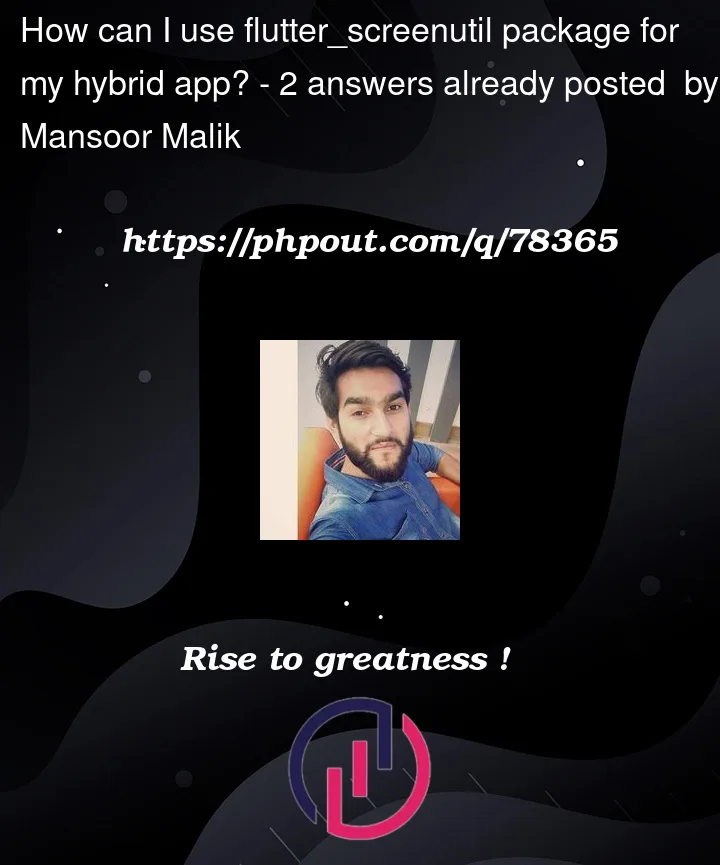Here is how I have used flutter_screenutil in my project but getting error on when I tap on Textfield.
Kindly tell me how to use this package properly.
Note I want to use The second way of flutter_screenutil
My error:
No Overlay widget exists above EditableText-[LabeledGlobalKey#d3506](controller: TextEditingController#dc3bb(TextEditingValue(text: ┤ghf├, selection: TextSelection.collapsed(offset: 3, affinity: TextAffinity.downstream, isDirectional: false), composing: TextRange(start: 0, end: 3))), focusNode: FocusNode#482e2([PRIMARY FOCUS]), autocorrect: false, debugLabel: ((englishLike titleMedium 2014).merge(blackMountainView titleMedium)).merge(unknown), inherit: false, color: Color(0xff878787), family: EncodeSans_regular, familyFallback: [EncodeSans], size: 16.0, weight: 400, baseline: alphabetic, decoration: TextDecoration.none, textAlign: start, keyboardType: TextInputType(name: TextInputType.text, signed: null, decimal: null), autofillHints: [], dirty, dependencies: [Directionality, MediaQuery, ScrollConfiguration], state: EditableTextState#1d73f(tickers: tracking 1 ticker)). Usually the Navigator created by WidgetsApp provides the overlay. Perhaps your app content was created above the Navigator with the WidgetsApp builder parameter. ‘package:flutter/src/widgets/text_selection.dart’: Failed assertion: line 610 pos 7: ‘overlay != null’
main.dart
void main() async {
await ScreenUtil.ensureScreenSize();
runApp(const MyApp());
}
class MyApp extends StatelessWidget {
const MyApp({super.key});
@override
Widget build(BuildContext context) {
return MaterialApp(
debugShowCheckedModeBanner: false,
builder: (ctx, child) {
ScreenUtil.init(ctx);
return Theme(
data: ThemeData(
primarySwatch: Colors.blue,
),
child: const HomeScreen());
},
);
}
}
HomeScreen.dart
class HomeScreen extends StatefulWidget {
const HomeScreen({Key? key}) : super(key: key);
@override
State<HomeScreen> createState() => _HomeScreenState();
}
class _HomeScreenState extends State<HomeScreen> {
@override
Widget build(BuildContext context) {
ScreenUtil.init(context, designSize: const Size(360, 739));
TextEditingController searchController = TextEditingController();
return SafeArea(
child: Scaffold(
body: Padding(
padding: EdgeInsets.symmetric(
horizontal: kPaddingHorizontal,
),
child: Column(
children: [
Row(
mainAxisAlignment: MainAxisAlignment.spaceBetween,
crossAxisAlignment: CrossAxisAlignment.center,
children: [
Column(
crossAxisAlignment: CrossAxisAlignment.start,
mainAxisAlignment: MainAxisAlignment.center,
children: [
Text(
"Hello, Welcome",
style: kEncodeSansRegular.copyWith(color: kDarkBrown),
),
SizedBox(height: 5.h),
Text(
"Hello, Welcome",
style: kEncodeSansBold.copyWith(color: kDarkBrown),
),
],
),
CircleAvatar(
radius: 23.r,
backgroundImage: const AssetImage("assets/images/image5.png"),
),
],
),
SizedBox(height: 20.h),
Row(children: [
Expanded(
child: TextField(
style: kEncodeSansRegular.copyWith(color: kDarkGrey),
controller: searchController,
keyboardType: TextInputType.text,
autocorrect: false,
decoration: InputDecoration(
isDense: true,
contentPadding: EdgeInsets.symmetric(horizontal: 10.w),
prefixIcon: const Icon(
Icons.search,
color: kGrey,
),
hintText: "Search Clothes...",
border: kInputBorder,
errorBorder: kInputBorder,
disabledBorder: kInputBorder,
focusedBorder: kInputBorder,
focusedErrorBorder: kInputBorder,
enabledBorder: kInputBorder,
hintStyle: kEncodeSansRegular.copyWith(color: kDarkGrey),
),
),
),




2
Answers
You can separate the MaterialApp on different context, for this you can do
try this